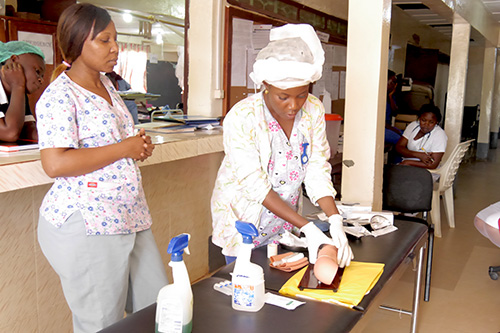News
Joy after a frightening preterm delivery in Liberia
- 16 September 2019
News
KAKATA, Liberia – Out of nine pregnancies, Anna Bondo had suffered seven stillbirths, each one a crushing heartbreak. Every loss came as a result of premature labour, the 43-year-old told UNFPA. Last month, pregnant for the tenth time, Ms. Bondo once again went into an early labour. She immediately feared the worst.
“I was downhearted,” she said. “I thought I was going to lose my baby again.”
At 35 weeks, the birth would be considered “late preterm”, which comes with a host of risks for the baby, including respiratory distress. Most late preterm babies survive – but equipped health facilities and trained staff are essential to support their care.
Yet Liberia struggles to provide sufficient maternal and newborn care services. The country has one of the 10 highest maternal death rates in the world, and an extremely high infant mortality rate as well. A newborn has a 51 in 1,000 chance of dying in the first 28 days of life, according to 2017 data.
Quality health care can be especially hard for women to access outside the capital, such as in the largely rural Margibi County, where Ms. Bondo lives.
But this time, Ms. Bondo was lucky.
She went to the C.H. Rennie Hospital, and was put into the capable hands of Dr. Susan Kimono, a Ugandan obstetrician and gynaecologist deployed to Margibi’s Kakata City.
Dr. Kimono delivered a tiny girl who struggled to breathe. She required special care in the hours after delivery.
“As expected, the baby was born underweight, weighing just 1.6 kg. We immediately moved the newborn to the Neonatal Unit for intensive care,” Dr. Kimono explained.
The Neonatal Unit – supported by UNFPA and Maternal & Childhealth Advocacy International – provides critical care for premature and sick newborns.

Ms. Bondo named her baby Dorcas. Together, they spent three weeks in the hospital, and were discharged on 13 August, both in good health.
“My baby is alive and safe after 19 days spent under intensive care,” Ms. Bondo said. “If it was not for the doctors and nurses, my baby would not be alive today.”
In addition to providing life-saving care to women and their newborns, Dr. Kimono also provides training to junior doctors, nurses and midwives, acting as a mentor and guide both in the hospital and in post-graduate institutions throughout Liberia.
“It is a blessing to have Dr. Kimono assigned with us at the C.H Rennie Hospital,” Yarkpazuo Kollie, a doctor-in-training, told UNFPA. “I have been able to acquire more skills in emergency obstetric care.”
The programme that brings teaching doctors like Dr. Kimono to Liberia is funded with support from Johnson&Johnson as part of a 5-year collaboration, from 2015 to 2020, in Liberia, Haiti and Pakistan.
UNFPA also supports midwifery schools and provides maternal health equipment and supplies to health facilities, part of broader efforts with the Government of Liberia to strengthen maternal health systems in the country.